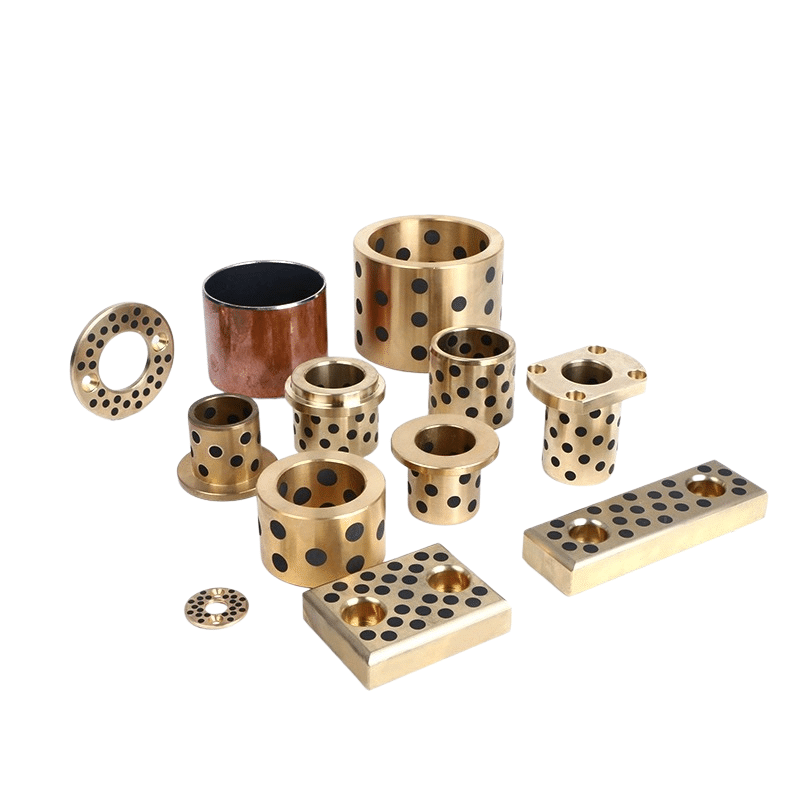ADVANTAGES OF ALLOYS
Bearings and Bushings for the Future: Precision and Customization: Our company, in bearing engineering with decades of experience, designs and develops high-precision self-lubricating bronze bearings & plain bushes. We offer a wide array of sliding bearings tailored to meet specific needs. Renowned for our expertise in custom bronze bushing and slide plate solutions, we provide an expansive selection of bushing metal alloys. Contact us today to benefit from unparalleled services at competitive prices.
ADVANTAGES OF ALLOYS
Explore Other Alloys, Suggested Searches: Copper Brass Bronze Copper Nickel
Bearing Bushing, Search Our Material Alloy
Understanding Alloys and Their Advantages Over Pure Metals in Applications Like Bronze Bushings
What is an Alloy?
An alloy is a blend of chemical elements, with at least one being a metal. Alloys retain the intrinsic properties of metals but typically exhibit enhanced characteristics such as improved strength, hardness, and corrosion resistance. By mixing two or more elements, engineers can customize these materials to meet specific requirements, making alloys integral to various sectors, including aerospace and medical device manufacturing.
Common Uses of Alloys
Due to their superior properties, alloys are utilized across a wide array of applications:
- Construction and Machinery: Steel, an iron-carbon alloy, is favored for its durability and strength, essential for buildings and industrial tools.
- Automotive and Aerospace: Lightweight yet strong alloys like aluminum and titanium are critical in manufacturing vehicles and aircraft.
- Electrical and Electronics: Copper alloys are chosen for their excellent electrical conductivity, used in wiring and electronic components.
- Consumer Goods: From kitchen utensils to mobile phones, alloys are selected for both aesthetic appeal and functional properties.
Enhanced Properties of Alloys
Alloys are engineered to improve several key characteristics:
- Strength and Hardness: Alloys generally surpass the strength and hardness of their constituent pure metals, such as steel being stronger than iron.
- Corrosion Resistance: Alloys like stainless steel are more resistant to corrosion, thanks to elements like chromium.
- Thermal and Electrical Conductivity: Certain alloys are optimized for specific uses that require excellent conductivity.
- Versatility: The customizability of alloys allows for tailored solutions to meet diverse application needs.
Advantages of Alloys Over Pure Metals
- Strength and Durability: Alloys enhance the mechanical properties of metals, making them suitable for more rigorous applications where pure metals might fail.
- Corrosion Resistance: Alloys often outperform pure metals in resisting corrosion, crucial for use in harsh environments.
- Customizability: The ability to engineer alloys with specific properties makes them highly adaptable to various industrial needs.
- Cost-Effectiveness: Alloys can be more economical by blending expensive metals with more affordable ones, balancing performance and cost.
Benefits of Alloy Bronze Bushings
Bronze bushings, primarily made from copper and tin, provide significant advantages over pure metal bushings:
- Corrosion Resistance: They excel in environments prone to corrosion, such as marine settings.
- High Temperature Tolerance: Bronze maintains its integrity even at elevated temperatures, unlike many pure metals.
- Wear Resistance: The durability of bronze reduces maintenance needs and operational downtime.
- Machinability: Bronze’s ease of machining enables precise fabrication of components.
Comparison: Alloy Bronze Bushing vs. Pure Metal Sleeve Bushing
- Composition: Bronze bushings are alloys, whereas pure metal bushings consist of only one metal type.
- Properties: Bronze offers superior corrosion and wear resistance and better performance at high temperatures than pure metals.
- Applications: Bronze bushings are suited to more demanding roles, such as in heavy machinery and marine propellers, where pure metals would not suffice.
In summary, the versatility and enhanced properties of alloys, such as those used in bronze bushings, make them indispensable for a broad spectrum of industrial applications, outperforming pure metals in durability, functionality, and cost-effectiveness. These benefits underscore why alloys are a preferred choice in fields requiring robust, long-lasting materials.

ADVANTAGES OF ALLOYS
self-lubricating alloy bushing
4
Providing Brass, Bronze, and Specialty Copper Alloys, Copper Alloy Machining Services

Solutions For Every Industry
Searching for Dependable Bushing Solutions? viiplus Has What You Need.

Design Guides, Materials
Bushing design, Comprehensive design manuals covering a range of self-lubricating materials used in all of viiplus’s manufacturing processes.

Technical Guides
Manufacturing On Demand, Technical Guides For Machining Design. Discover the latest in metal alloys, materials, and design tips for manufacturing custom machined and self-lubricating bearing parts.

Get Instant Quote
To receive your instant quote, simply upload your drawing file and choose your production process & bushing material.

Prototyping, Place Order
After you place your order, we will start the production process. You will receive updates when your order has completed production and is ready to be dispatched.

Receive Your custom Parts
We provide precision-inspected high-quality parts, packing lists and documents, and delivery tracking.

